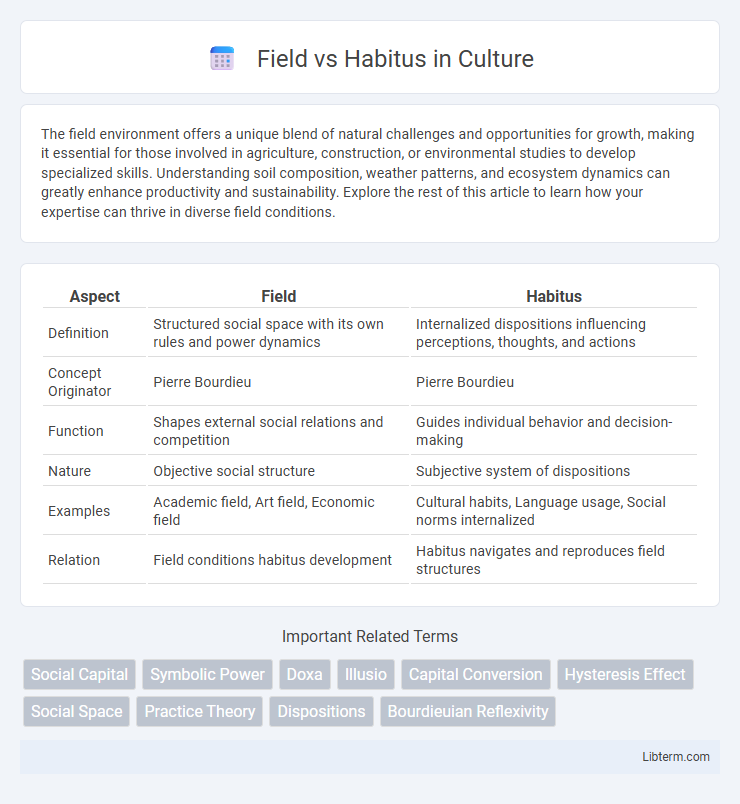The field environment offers a unique blend of natural challenges and opportunities for growth, making it essential for those involved in agriculture, construction, or environmental studies to develop specialized skills. Understanding soil composition, weather patterns, and ecosystem dynamics can greatly enhance productivity and sustainability. Explore the rest of this article to learn how your expertise can thrive in diverse field conditions.
Table of Comparison
| Aspect | Field | Habitus |
|---|---|---|
| Definition | Structured social space with its own rules and power dynamics | Internalized dispositions influencing perceptions, thoughts, and actions |
| Concept Originator | Pierre Bourdieu | Pierre Bourdieu |
| Function | Shapes external social relations and competition | Guides individual behavior and decision-making |
| Nature | Objective social structure | Subjective system of dispositions |
| Examples | Academic field, Art field, Economic field | Cultural habits, Language usage, Social norms internalized |
| Relation | Field conditions habitus development | Habitus navigates and reproduces field structures |
Understanding the Concepts: Field and Habitus
Field refers to structured social spaces with specific rules, power relations, and struggles influencing individual and group behavior, while habitus encompasses the ingrained dispositions, habits, and perceptions shaped by past experiences within these fields. Understanding the interaction between field and habitus reveals how social structures and individual agency are mutually constitutive, with habitus adapting to and reinforcing the dynamics of the field. This conceptual framework, developed by sociologist Pierre Bourdieu, is essential for analyzing how social practices and inequalities persist and evolve.
Origins of Field and Habitus in Bourdieu’s Theory
Bourdieu's concept of Field originates from his analysis of social spaces where individuals and groups compete for resources and power, shaped by distinct rules and capital forms. Habitus refers to the ingrained dispositions and cognitive structures developed through an individual's history, enabling navigation and strategy within various fields. The dynamic interplay between Field and Habitus explains how social structures reproduce themselves while allowing for individual agency within Bourdieu's theory of practice.
Defining 'Field': Social Arenas of Power
Field refers to structured social arenas where individuals and groups compete for resources, status, and power, each governed by distinct rules and capital forms such as economic, cultural, or social capital. These arenas are interconnected yet autonomous, shaping agents' behaviors and strategies based on their position within the field. Bourdieu's concept emphasizes how power relations within fields influence social dynamics and individual habitus, reinforcing or challenging existing social hierarchies.
Exploring 'Habitus': Internalized Dispositions
Habitus refers to the deeply ingrained habits, skills, and dispositions individuals acquire through their life experiences, shaping perceptions and actions within various social contexts. This internalized system of structures influences how people navigate and respond to the social fields they inhabit, often unconsciously guiding behavior according to class, culture, and background. Understanding habitus is crucial for analyzing how social practices are reproduced and transformed across generations without overt awareness or deliberate intention.
Key Differences Between Field and Habitus
Field refers to the social arenas or structured spaces where individuals compete for resources, status, and power, while habitus represents the deeply ingrained dispositions, habits, and ways of thinking shaped by past experiences and social background. Fields are external and objective environments defined by rules and hierarchies, whereas habitus is internal, guiding perceptions, actions, and motivations unconsciously. The key difference lies in field shaping social positions and opportunities, while habitus influences how individuals navigate and interpret those fields.
The Dynamic Relationship: How Field and Habitus Interact
Field and habitus continuously shape each other through dynamic interactions where the structure of the social field influences individual dispositions, while those dispositions simultaneously modify the field's parameters. Bourdieu's theory highlights that habitus, as internalized social norms, navigates and adapts within the power dynamics of a given field, reinforcing or challenging existing hierarchies. This reciprocal relationship ensures that changes in the field impact habitus, which then recalibrates the field's structure through collective practices and behaviors.
Field vs Habitus: Real-World Examples
The concept of Field versus Habitus can be illustrated through examples like the academic field, where professors' habitus shapes their approach to research and teaching, while the field's structure governs power dynamics and expectations. In the art world, an artist's habitus influences creative choices and stylistic preferences, yet the field's market demands and institutional recognition impact their success and opportunities. Similarly, in sports, an athlete's habitus informs training discipline and strategic thinking, but the competitive field defines the rules, rewards, and hierarchical status among players.
Influence of Field on the Formation of Habitus
The concept of Field significantly shapes the formation of Habitus by providing the social context in which individuals internalize norms, values, and practices. Within a given Field--such as education, art, or politics--actors' positions and power relations influence their perceptions and dispositions, molding their Habitus over time. This dynamic process ensures that Habitus reflects the structures and power dynamics of the specific Field, perpetuating social structures through embodied practices.
Limitations and Critiques of Field and Habitus
Field and Habitus, foundational concepts in Pierre Bourdieu's theory, face critiques regarding their rigid structural determinism, as critics argue they may underemphasize individual agency and social change. The concept of Field is often seen as overly bounded, limiting the analysis of overlapping and evolving social spaces. Habitus is criticized for its potential to naturalize social inequalities by emphasizing ingrained dispositions, which can obscure the role of conscious resistance and reflexivity.
Field and Habitus in Contemporary Social Analysis
Field and habitus are central concepts in contemporary social analysis, explaining how individual behaviors are shaped by structural contexts and internalized dispositions. Field refers to the dynamic social spaces structured by power relations and capital forms, while habitus represents the ingrained habits and perceptions developed through past experiences within these fields. The interaction between field and habitus illustrates how social agents navigate and reproduce systemic inequalities, providing a nuanced framework for understanding social practices and transformations.
Field Infographic

 libterm.com
libterm.com